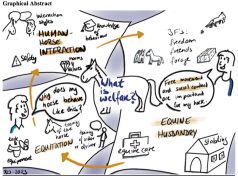By Dr. Suresh Neethirajan
Table: © Suresh Neethirajan
As a follow-up to last month’s article that focused on what equestrian sport might learn from other industries in terms of the Social Licence to Operate, the following offers some fascinating insights into how Artificial Intellingence might help with assessing affective states in domestic livestock – especially equines – thereby offering pathways to a better understanding of their welfare needs.
In order to promote the welfare of farm animals, there is a need to be able to recognize, register, and monitor their affective states. Numerous studies show that just like humans, non-human animals are able to feel pain, fear, and joy amongst other emotions, too. While behaviorally testing individual animals to identify positive or negative states is a time- and labor-consuming task to complete, artificial intelligence and machine learning open up a whole new field of science to automatize emotion recognition in production animals. By using sensors and monitoring indirect measures of changes in affective states, self-learning computational mechanisms will allow an effective categorization of emotions and consequently can help farmers to respond accordingly. Not only will this possibility be an efficient method to improve animal welfare, but early detection of stress and fear can also improve productivity and reduce the need for veterinary assistance on the farm.
Whereas affective computing in human research has received increasing attention, the knowledge gained on human emotions is yet to be applied to non-human animals. Therefore, a multidisciplinary approach should be taken to combine fields such as affective computing, bioengineering and applied ethology in order to address the current theoretical and practical obstacles that are yet to be overcome.
Introduction
Compiling evidence that non-human animals are able to use complex cognitive process and show emotions is appearing. An increasing body of literature has investigated the complexity of the animal mind and their ability to show emotions such as fear, pleasure, jealousy and grief (1–4). This evidence leads us to the question of how we could recognize and monitor affective states in livestock. This knowledge is essential to improve the welfare of farm animals kept in captivity through recognizing negative emotions and acting upon them, while promoting positive affective states... To read the complete article you need to be a subscriber
CLICK HERE TO SUBSCRIBE TO BREEDING NEWS
SUBSCRIBERS CAN READ THE COMPLETE ARTICLE BY LOGGING IN AND RETURNING TO THIS PAGE




